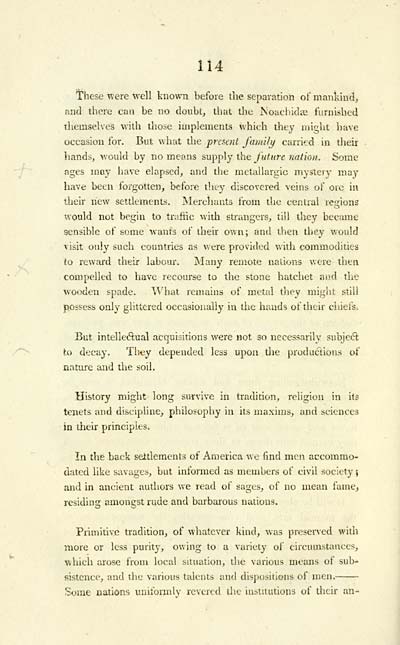Blair Collection > Celtic researches, on the origin, traditions & language, of the ancient Britons
(204)
Download files
Complete book:
Individual page:
Thumbnail gallery: Grid view | List view

Î14
these \\ere well known before the separation of mankind,
and there can be no doubt, that the Noacliidae furnished
themselves with those implements which they might have
occasion lor. But what the preaent family carried in tlieir
hands, v/ould by no means supply the future nation. Some
ages may have elapsed, and the metallargic mystery may
have been forgotten, before they discovered veins of ore in
their new settlements. Merchants from the central regions
■vould not begin to troftic Avith strangers, till they became
sensible of some wants of their ovai; and then tliey would
visit only such countries as were provided with commodities
to reward their labour. Many remote nations v.ere then
compelled to have recourse to the stone hatchet and the
wooden spade. What remains of metal tliey might still
possess only glittered occasionally in the hands of their chiefs.
But intelleŵual acquisitions were not so necessarily subjcift
to decay. Tliey depended less upon the productions of
nature and the soil.
History might long survive in tradition, religion in its
tenets and discipline, philosophy in its maxims, and sciences
in their principles.
ϊη the back settlements of America we find men accommo-
dated like savages, but informed as members of civil society ;
and in ancient authors we read of sages, of no mean fame,
residing amongst rude and barbarous nations.
Primitive tradition, of whatever kind, was preserved widi
more or less purity, owing to a variety of circumstances,
which arose from local situation, the various means of sub-
sistence, and the various talents and dispositions of men.
Some nations nniforndv revered the institutions of their an-
these \\ere well known before the separation of mankind,
and there can be no doubt, that the Noacliidae furnished
themselves with those implements which they might have
occasion lor. But what the preaent family carried in tlieir
hands, v/ould by no means supply the future nation. Some
ages may have elapsed, and the metallargic mystery may
have been forgotten, before they discovered veins of ore in
their new settlements. Merchants from the central regions
■vould not begin to troftic Avith strangers, till they became
sensible of some wants of their ovai; and then tliey would
visit only such countries as were provided with commodities
to reward their labour. Many remote nations v.ere then
compelled to have recourse to the stone hatchet and the
wooden spade. What remains of metal tliey might still
possess only glittered occasionally in the hands of their chiefs.
But intelleŵual acquisitions were not so necessarily subjcift
to decay. Tliey depended less upon the productions of
nature and the soil.
History might long survive in tradition, religion in its
tenets and discipline, philosophy in its maxims, and sciences
in their principles.
ϊη the back settlements of America we find men accommo-
dated like savages, but informed as members of civil society ;
and in ancient authors we read of sages, of no mean fame,
residing amongst rude and barbarous nations.
Primitive tradition, of whatever kind, was preserved widi
more or less purity, owing to a variety of circumstances,
which arose from local situation, the various means of sub-
sistence, and the various talents and dispositions of men.
Some nations nniforndv revered the institutions of their an-
Set display mode to: Large image | Transcription
Images and transcriptions on this page, including medium image downloads, may be used under the Creative Commons Attribution 4.0 International Licence unless otherwise stated. ![]()
| Early Gaelic Book Collections > Blair Collection > Celtic researches, on the origin, traditions & language, of the ancient Britons > (204) |
|---|
| Permanent URL | https://digital.nls.uk/75766129 |
|---|
| Description | A selection of books from a collection of more than 500 titles, mostly on religious and literary topics. Also includes some material dealing with other Celtic languages and societies. Collection created towards the end of the 19th century by Lady Evelyn Stewart Murray. |
|---|
| Description | Selected items from five 'Special and Named Printed Collections'. Includes books in Gaelic and other Celtic languages, works about the Gaels, their languages, literature, culture and history. |
|---|

